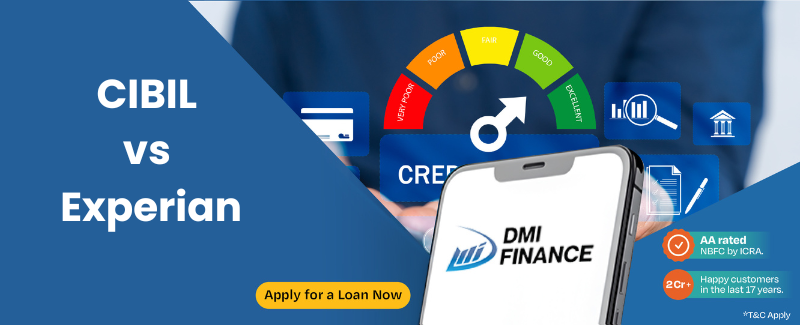- Published on: 22 Nov 2025
- Last updated on: 18 Feb 2026
- Post Views: 11824


A recent survey found that 45% of Indians never checked their credit score. While this may be true, every bank and non-banking financial company (NBFC) checks a credit score when processing a loan, no matter how small or big it is. However, there isn’t just one credit bureau in India, but four. Among these, Experian and CIBIL are the most popular.
As a borrower, knowing the difference between Experian vs CIBIL holds much importance to you, as different lenders (Banks or NBFCs) accept different companies and scores. In this blog, we will understand the key CIBIL vs Experian differences and which matters more.

Credit Information Company (CIC) or credit bureau is an organisation that gathers your financial information, such as your loan repayments, credit card purchases, and late payments. It then calculates a credit score based on these details. Lenders use your credit score to determine whether you are a reliable borrower or not. There are four primary credit bureaus of India that are regulated by the Reserve Bank of India (RBI):
All four bureaus follow your credit activity and prepare credit reports. However, CIBIL and Experian are the most used and accepted by banks and individuals. They are both licensed CICs.
Both these bureaus operate independently. Hence, they both have different data and update your report at slightly different times, which produces minor differences in your scores. This is why if you ever notice that your Experian and CIBIL scores are different, it is normal.
Here are the key differences between Experian vs CIBIL you must understand as a borrower:
1. Origin and History
Thus, CIBIL is older in the Indian market, and thus most banks have had older and more powerful relationships with it.
2. Scoring Range
Both bureaus have the same 3-digit score to indicate your creditworthiness:
The bigger your number, the higher your credit. In general, a number above 750 is considered good by most lenders.
3. Calculation Method
Both credit bureaus use somewhat different formulas and parameters to determine your score.
This implies that even when you share the same credit history, the two can be slightly different.
4. Accuracy and Updates
Occasionally, data reported to these bureaus may vary depending on the lenders’ update frequencies.
5. Lender Acceptance
CIBIL is older in India, and thus most banks and NBFCs rely more on it. Experian, on the other hand, is catching up fast now, particularly among newer fintech lenders and mobile loan apps. Both these bureaus are reliable, and it will depend on your lender which one they want to go with.

| Criteria | CIBIL | Experian |
| Presence | Only in India | Globally present in 39+ countries. |
| Established/Licensed | Established in India in 2000 | Licensed in 2010 in India |
| Score Range | 300-900 | 300-900 |
| Best Credit Score in India | 750+ is considered excellent | 800+ is considered excellent |
| Popularity | Used by 90% of Indians | Second popular after CIBIL |
| Subscription Fees | ₹159 for just credit report ₹550 for 1 month ₹800 for 6 months ₹1,200 for 12 months | ₹499 per online credit report |
| Report delivery (offline) | Up to 7 days | Up to 20 days |
| Dispute Resolution | Free on the CIBIL site (Once a year) | Free on the Experian site |
| Checking Credit Score | Raising a dispute online | Free on Experian site |
Here is how you can check the CIBIL and Experian scores online:
CIBIL cites in a report that regular self-monitoring has helped 46% users to improve their credit scores and reports. This shows that no matter the credit bureaus, monitoring your credit scores is important to improve your creditworthiness, and so is making regular payments, maintaining a credit mix, and keeping credit utilisation below 30%. You can also check your credit score as many times as you want on the DMI Finance app. It is completely free and easy to use.
Besides creditworthiness, a good credit score shows financial discipline. When you apply for a loan, it also helps you get a low interest rate and attractive terms.
1. Why is my Experian score higher than my CIBIL score despite the fact that my loans are identical?
Both credit bureaus’ working and calculation models are slightly different and are revised at different times. This is why your CIBIL and Experian scores are different.
2. Will I get approved for a loan if my CIBIL score is bad but my Experian score is good?
Possibly. Different lenders use different credit scores and different credit bureaus. Your loan application will be approved if the lender uses the Experian score or both.
3. Do FinTech apps actually use Experian over CIBIL?
FinTech companies do not use Experian over CIBIL exclusively. Instead, most FinTech lenders rely on data from multiple credit bureaus.
4. Does frequently checking my CIBIL or Experian score lower it?
No, checking your CIBIL or Experian score is considered a soft inquiry, which does not affect your credit score.
5. Can my CIBIL score increase more quickly than my Experian score?
It varies based on the speed with which lenders report to a particular bureau. The reporting frequency varies.
6. What do I do if my Experian and CIBIL reports show different loan details?
You have to report the dispute to the bureau that has provided the wrong data so they can rectify it.
7. Do credit card issuers usually check CIBIL or Experian?
Most credit card issuers prefer to check CIBIL, while other credit card companies use both CIBIL and Experian scores.
8. Can one have a CIBIL score but no Experian score?
Yes, it is possible to have a CIBIL score but no Experian score, or vice versa, although under recent regulations, this is becoming less common. Reserve Bank of India (RBI) has mandated that all regulated lenders must become members of, and share all data with, all four credit bureaus.
9. How often should I review both my CIBIL and Experian reports?
It is recommended that you review your reports at least once every three months to find any errors or mismatches that can reduce your credit score.


